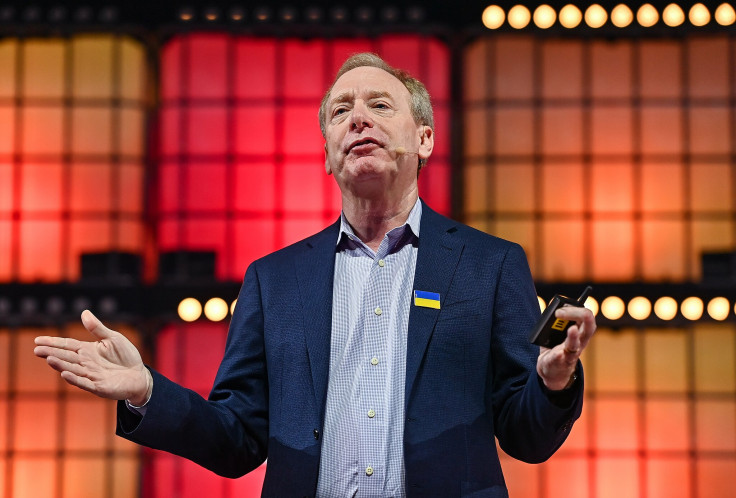
In a shift from past criticism, Microsoft's Brad Smith now says the UK regulator's tough stance on the Activision deal was "tough and fair".
Last year, the UK's Competition and Markets Authority (CMA) blocked Microsoft's Activision Blizzard deal. Britain's antitrust regulator believed the deal could damage the industry if the Redmond-based tech giant used its control over fan-favourite games like "Call of Duty" and "World of Warcraft" to harm rivals.
As expected, Microsoft president Brad Smith wasn't happy with the CMA. However, the top executive has changed his tone now that the company has won approval in the UK after the regulator reversed its earlier decision to block the $69 billion (about £54.60 billion) deal.
As part of the huge court battles for Activision-Blizzard, Microsoft locked horns with the European Union, United States FTC and UK CMA for regulatory approval. To ensure competition is maintained, the UK forced the software giant to license out cloud gaming rights to Montreuil-based video game publisher company Ubisoft.
Microsoft completes Activision Blizzard deal despite FTC opposition
Likewise, the EU approved the acquisition after urging Microsoft to provide unrestricted access to all Activision Blizzard games via a "free licence" arrangement for cloud gaming streaming platforms.
The US FTC, on the other hand, is sparing no effort in a bid to overturn the acquisition after Microsoft finally closed its deal for Activision-Blizzard last October. Bobby Kotick, the former CEO of Activision Blizzard, left his position on December 29, 2023.
i worked on COD for two years as a programmer at demonware
— christina 死神 (@chhopsky) December 29, 2023
bobby's decisions made our games worse
in my first month it came out he threatened to have an employee killed. in the all-hands that followed, no-one wanted to speak first. so i demanded his firing in front of everyone https://t.co/yhlM5xqPPg
Now, a considerable number of shareholders, developers, as well as Activision customers are optimistic about the future of the company with Microsoft at the helm. So, it was confusing why the UK regulatory body initially blocked the Microsoft deal.
With Bobby Kotick finally leaving Activision Blizzard I hope they can turn things around and return to their glory days of releasing top-tier polished games like when I was a kid. Hopefully, Microsoft have a positive influence! pic.twitter.com/AALOFFmGEw
— GhostGaming (@GhostGamingG) December 30, 2023
While it is still unclear whether Microsoft planned to eventually dominate the gaming industry, competition between streaming services is nothing new. Media industry turmoil in the US has seen major streaming services like Netflix and Disney+ going toe-to-toe, as actors and writers try to get better pay and conditions.
It is also worth noting that popular streaming services like Netflix have been raising prices at a more rapid rate than Microsoft's Xbox Game Pass, which is based on a similar structure.
Brad Smith forms a better opinion of the UK CMA
Brad Smith said confidence in the UK had been "severely shaken" after the CMA decided to block Microsoft's massive deal in April last year.
In addition to labelling it as the "darkest day" for the company in its 4 decades of operating in Britain, Smith noted that the "European Union is a more attractive place to start a business" than the UK.
However, the top executive has now changed his tone, using kinder words to describe the CMA's initial resistance in an interview with BBC Radio 4's Today program.
According to Smith, the CMA was "tough and fair" in initially blocking the acquisition of Activision Blizzard by Microsoft. "I certainly learned a lot personally," Smith said on Radio 4.
"I wouldn't step back necessarily from all of the concerns I raised when I talked way back in April, but I might choose slightly different words to make my point," he added.
To win CMA's approval, Microsoft had to restructure its Activision Blizzard deal. The company even had to give up cloud gaming rights in the UK and several other markets.
However, Smith insists he respects the fact that the CMA held them to a tough standard. "It pushed Microsoft to change the acquisition that we had proposed for Activision Blizzard, to spin out certain rights that the CMA was concerned about with respect to cloud gaming," added Smith.
Unimpressed with Microsoft's tactics, CMA CEO Sarah Cardell had warned businesses and their advisors against following in the footsteps of the American tech giant when it comes to dealing with the CMA.
After months of regulatory scrutiny, the CMA finally allowed the deal to close in October. Smith, who seems to have had a change of heart, released a statement last month noting that Microsoft is gearing up to spend $3.2 billion (£2.5 billion) to create a large AI infrastructure in the UK.







